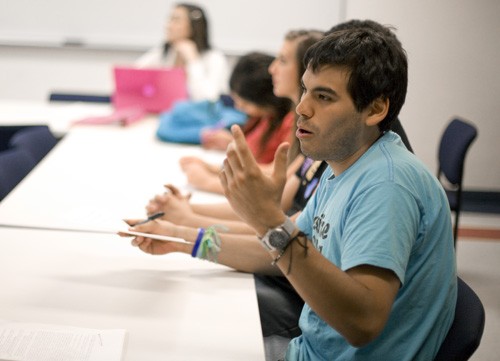A collection of students and ASUA representatives began drafting an official resolution against a proposed Arizona law that would prohibit courses advocating ethnic solidarity.
House Bill 2281, a bill that will be voted on in the Arizona Senate on April 18, states that students attending public schools should be taught to treat and value each other as individuals and not to resent other races or classes of people.
The bill would prohibit public schools from offering classes that promote the overthrow of the United States government, promote resentment toward a race or class of people, are designed primarily for people of a particular ethnic group or advocate ethnic solidarity instead of the treatment of pupils as individuals.
Francisco Lara Garcia, a senior studying political science and Latin American studies, directed the forum and is one of the students drafting the opposition statement. He said that the statement is an important place to start because it is a basis for action by UA students and the Tucson community as a whole.
“”This (H.B. 2281) is a racist piece of legislation,”” he said. “”The legislature is trying to stick its foot where it doesn’t belong.””
He explained that the bill violates the ability of schools to determine their own curricula and that it would negatively impact the UA because ethnic studies programs help recruit students to the university.
Katherine Weingartner, the executive vice president of the Associated Students of the University of Arizona, said this was the first time that a group of students made a rough-draft resolution without the help of someone in ASUA.
She stressed the importance of having the opposition statement show how the bill would affect UA students and higher education by showing its potential economic ramifications.
“”This bill would lower the quality of education that all Arizona students are getting,”” she said. “”And high school students in ethnic studies classes will not want to fill universities in the state.””
She added that a resolution, backed by ASUA, will increase the statement’s impact; however, students participating in the forum need to help get the message out using other venues of involvement.
Leilani Clark, a creative writing student at Pima Community College’s West Campus who was involved in the Tucson Unified School District ethnic studies program, said this was the third bill since 2006 attacking ethnic studies programs in Arizona.
She explained that TUSD was the first K-12 public school district with an ethnic studies program, and that 97.5 percent of high school students who took ethnic studies within TUSD graduated, in comparison to the Latino high school graduation rate of 48 percent.
“”This is a grudge gone wild,”” she said. “”It’s not an education bill, it’s a political move.””
Forum participants agreed that the final opposition statement should include statistics to show the importance of ethnic studies programs at the university level as well as show the negative effects the bill would have on the UA.
The forum agreed to meet again on March 21, in room 205 of the Cesar E. Chavez building.
The meeting, open to all students and participants, will be drafting the final opposition statement.
The final statement will then be presented and voted on by the ASUA Senate.









